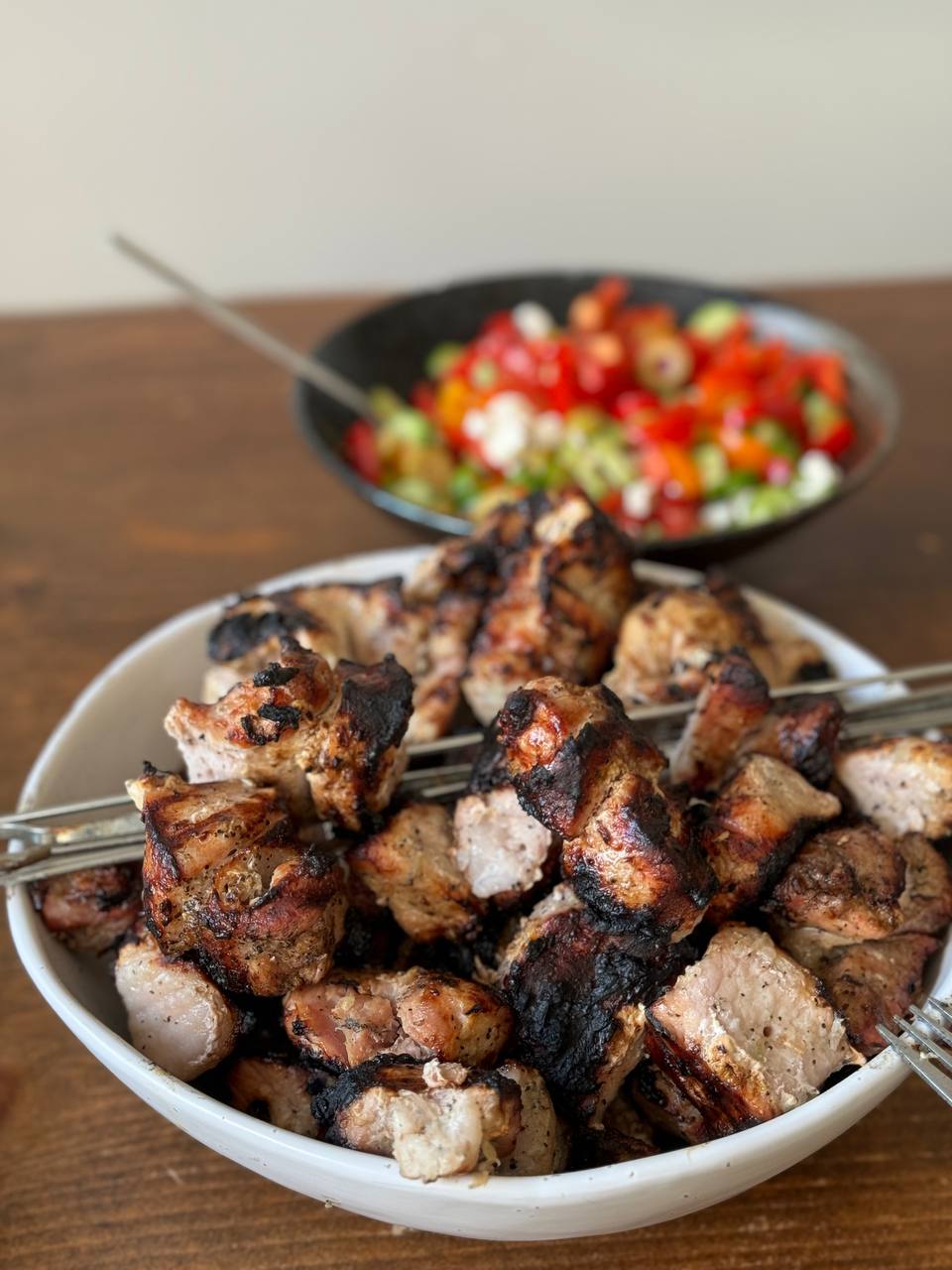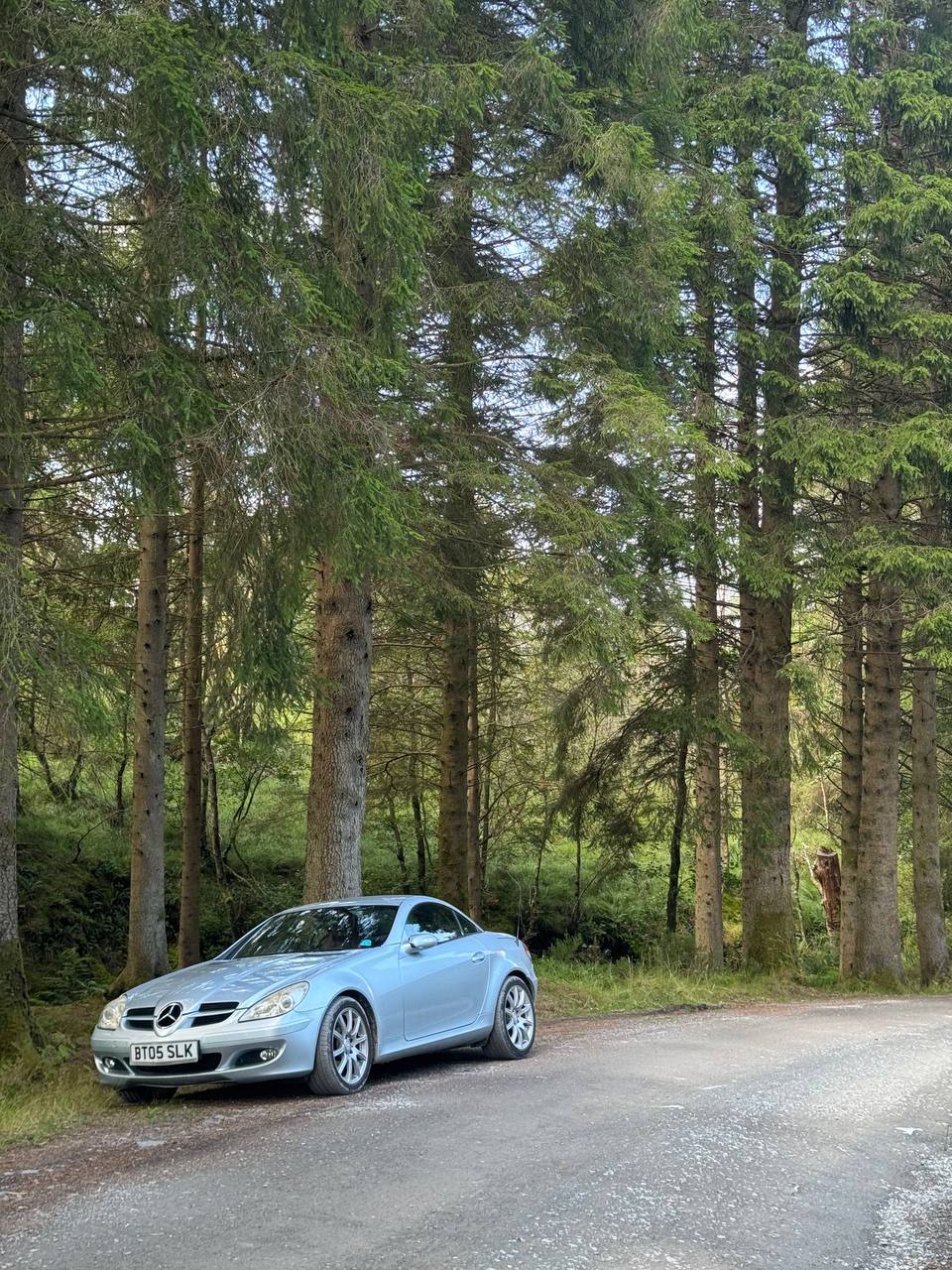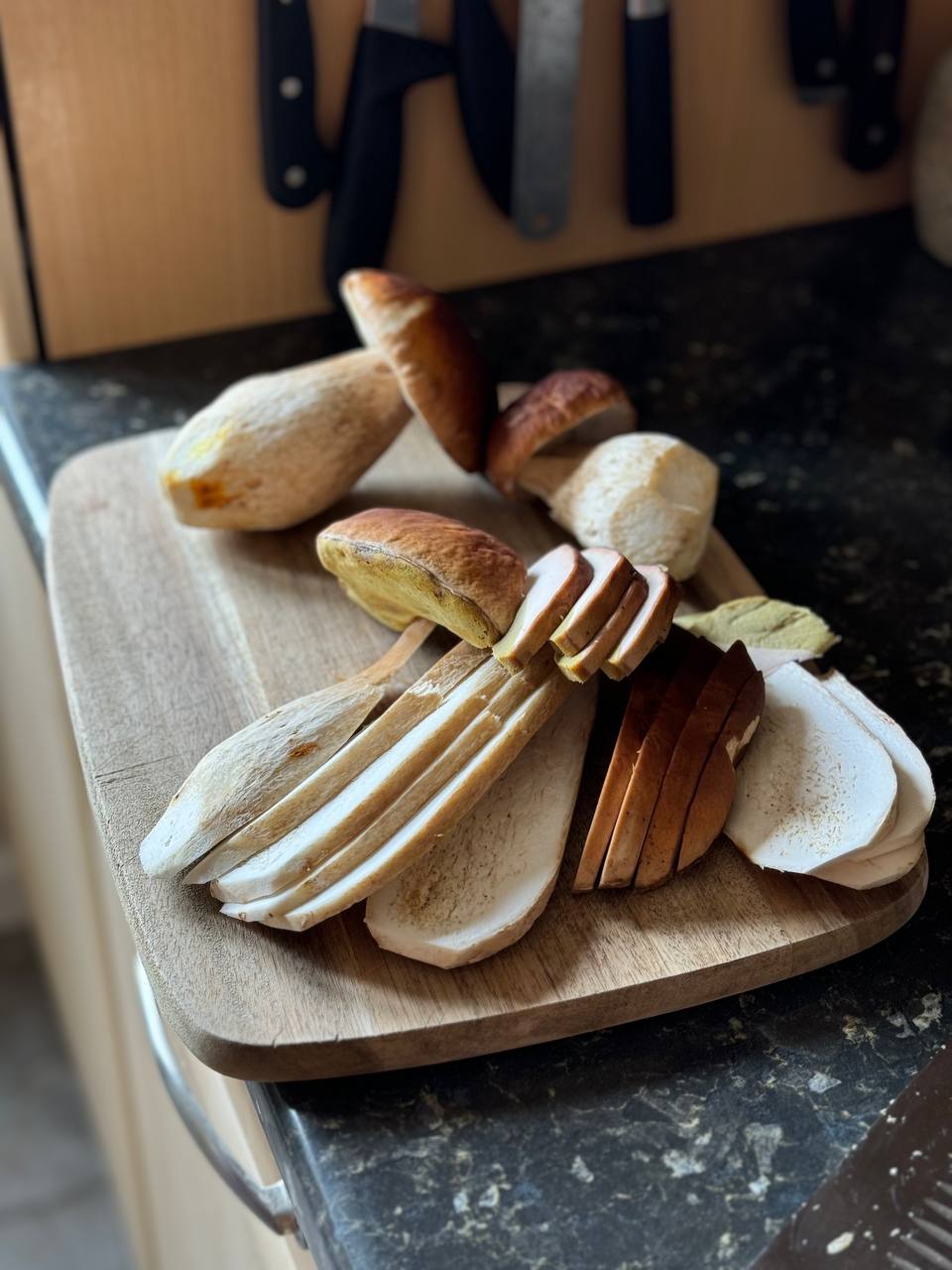#216
On first signs of Autumn
Even though it's already September, and even though this summer in the UK was the coldest in a decade, it still doesn't feel like Autumn yet, so I am not even close to wrapping up the BBQ season (this time somewhat inspired by Greek souvlaki).

At the same time, there are autumnal signs, namely first flushes of mushrooms, so for two weekends in a row we went to a woodland in Trossachs to try our luck.

We've also stopped by a farm with free-roaming goats and tried their ice cream, for some reason dilluted with oat milk (probably because people often find goat milk taste too overwhelming). I wasn't particularly fond of the ice cream itself – from the food production perspective it broke quite a few rules – but the place and time were very fitting so I can't really complain.

Sasha found quite a few ceps as well, while I refreshed my driving skills after a week in a country where everyone drives on the wrong side of the road.

I am not a big fan of porcini in most dishes, chanterelles are so much better, but this Japanese milk bread toast with some freshly fried ceps and eggs was delicious.

The rest of the harvest went into dehydrator, but it will be Autumn here for quite a while now, so stay tuned for more forests and (hopefully) more mushrooms.
Enjoying this? Get Tuesday Triage in your inbox every week.
Things I enjoyed reading
1. The Katsuification of Britain by Tim Anderson
Since my first years at school and up until I spent a few years in the UK, I was convinced that British cuisine was fish and chips, a cup o' tea, and (after some extracurricular learning) haggis. But in fact, it was mostly curry, chip buns, and piri-piri chicken. I never paid much attention to the widespread presence of katsu though, and wrongly assumed it's common everywhere.
Of course, it could be that every iteration of katsu curry, including refined Japanese restaurant versions like Hiden’s, will simply become subsumed into the ever-expanding and increasingly messy katsu curry universe. After all, as a British-inspired Japanese dish that’s now becoming a Japanese-inspired British dish, katsu curry is an ouroboros – and an insatiable one. Nothing can escape getting hoovered up in its gaping maw as it chomps away at its own tail. Until earlier this year, katsu curry was something that I was hyper-aware of; I couldn’t avoid it if I tried. There it was, at Sainsbury’s, at Wenzel’s, in burritos, on Detroit pizza with fish (?!?) – everywhere. But now it’s somehow slipped from my consciousness entirely, almost like it’s vanished. Because that’s what happens when something is too common – it’s so omnipresent that it becomes invisible, like the air that we breathe.
I can't really complain though: a good katsu wins over Coronation chicken or a bag of crisps every time, but I am yet to find katsu on pub menus despite the author insisting that it's impossible to avoid.
2. How Costco Hacked the American Shopping Psyche by Ben Ryder Howe
I haven't been to Costco ever in my life until a few weeks ago – mainly because I couldn't justify getting there using public transport. I drove there recently though, and when getting my membership card, the clerk has asked if I've been to the place before, and following the dismissal reply said, "Oh you're in for a treat then, good luck", and it indeed took lots of luck not to buy half of their stock.
Ostensibly, Costco is a discount store, a place to save money and stretch your grocery dollar, but it is also an aspirational shopping experience, feeding that most American of appetites: conspicuous consumption.
Few companies have greater influence over what we eat (or wear, or fuel our cars with, or use for personal hygiene). Costco dominates multiple categories of the food supply — beef, poultry, organic produce, even fine wine from Bordeaux, which it sells more of than any retailer in the world. It is the arbiter of survival for millions of producers, including more than a million cashew farmers in Africa alone. (Costco sells half the world’s cashews.) Its private label, Kirkland, generates more revenue than towering brands like Nike and Coca-Cola.
I am usually very concious of my spending habits – money should be splunged on experiences, not things, unless these things are a key to an experience. Buying a car is a means to getting to travel to places you wouldn't visit otherwise, and in a similar fashion buying 20 lbs of pork loin is a great and relatively affordable way to experience the joy of making twenty salami sticks.
I am however due to driving to Costco tomorrow morning to fit winter tyres, so I have very little time to decide what experience would I bring closer by buying a six-pack bulk packaging of tomato ketchup while I am waiting for the car to be ready to collect.
3. Seeing America by train by Christine Mi
I remember watching old-school American Westerns as a kid, and there was always a scene with a train. Even some cartoons portraying Wild West had trains instrumental to the plot. And yet I never heard anyone saying anything about American trains, that is, unless it's ranting about suburban Caltrains around San-Francisco.
Dining is communal, and passengers are grouped in tables of four. Within hours of boarding the train, a friendly retired couple more or less adopted me, and over the next two days, we ate most of our meals together.
Toan and Maria had never been on a sleeper train before and were excited for a chance to see the country en route to Chicago.
They had come to the United States as refugees from Vietnam at age 30. Upon arrival, they quickly realized their work experience back home didn’t mean much to their new countrymen. So they moonlighted as dishwashers and collected odd jobs while getting their requisite degrees.
The post above is a wonderful narration about crossing some States in a sleeper, and it's also beautifully illustrated, so reads almost like a comics. Now I wonder how much time I need to take off work (and how much money to save) to do a similar trip – it sounds beautiful.
4. Why I'm unreachable and maybe you should be too by levels.io
I've been testing iOS 18 recently, and one thing that stands out is a great effort in providing users with better controls of their attention span: from summarised notifications, which pretty much kills all marketing tricks, to various settings for different Focus modes, like a way for Siri to automatically reply with text or voice depending on your surroundings.
If I keep getting distracted with messages/calls I can never get into flow state and my creative work will suffer. I have most of my notifications off and my devices are perpetually on Do Not Disturb mode from 00:00 to 23:59.
A lot of my new ideas slowly boil in my head over weeks, months, sometimes years. And undisturbed thinking and working time helps me get into that state. That's why I like to lead my life async.
I'd love to keep reducing my reachability – these days I have to manually go and enable phone calls when I am expecting one, or check social media apps by hand as I prefer not to let them send notifications, but there is definitely more room for improvement.
5. The secret inside One Million Checkboxes by eieio.games
Imagine building an app where you could only toggle checkboxes and nothing else, and then open the database that stores those checkboxes as 0s and 1s just to find some links to websites you didn't put there.
I assumed I’d been hacked. I poured over my logs, looking for evidence of an intrusion. I read and re-read my code, searching for how somebody could be stuffing strings into a database that should have just contained 0s and 1s.
I couldn’t find anything. My access logs looked fine. My (very simple) code was ok. My heart rate increased. My girlfriend patiently waited for me to join her for dinner. And then - wait.
Wait!
I saw it.
This is a hilarious story about a developer who did their best to prevent people from messing with their project, and a group of curious folks who ended up finding a way to communicate in a secret language on a page with a million checkboxes.
6. Euphemise this by John McWhorter
I really liked this essay where the author insists we should change euphemisms often as otherwise their meanings become more and more disconnected from what we meant originally:
A word, then, is like a bell tone, with a central pitch seasoned by overtones. As the tone fades away, the overtones can hang in the air. Words are similar, with opinion, assumption and, more to the point, bias as equivalents to the overtones. Crippled began as a sympathetic term. However, a sad reality of human society is that there are negative associations and even dismissal harboured against those with disabilities. Thus crippled became accreted with those overtones, so to speak, to the point that handicapped was fashioned as a replacement term free from such baggage.
That being said, I don't think it's the words per se that are meant to change – languages are living and breathing things, they're capable of those changes without someone's personal involvement – it's the meanings we imply and the stereotypes we have that could be improved.
7. Your Immune System is Not a Muscle by Rachel Thomas
I remember how when Covid happened, and we realised it's for a while, almost instantly everyone became rather knowledgeable about immune systems, viral loads, and virus mutations, but even though we understand many things, we still don't know a lot, and seems like certain factors like the number of flights (which weren't a thing a hundred years ago) change the parameters in equations we thought we've already nailed:
For instance, if a small tribe of hunter-gatherers caught a strain of influenza, the virus would die out once they had all caught it in short order, with no more hosts to spread to. The ability to circulate through megacities or crisscross the globe through international travel in our current world offers influenza far more opportunities to infect and time to mutate. It is able to continue infecting and reinfecting, decade after decade. Even viruses that don’t mutate much, such as measles, are able to continue infecting, due to dense populations and an ongoing supply of new people being born.
Apparently, there are also many people who believe that kids getting cold strengthen their immune system, but as the title points out, it doesn't really work that way, so it's better to avoid getting ill in the first place.
8. Did you lose your AirPods? by Alex Yancey
When I try to explain to someone a programmer's mind set, this is what I have in mind but struggle to convey:
Next, I narrowed it down by central office code (commonly called prefix) (those three digits after the area code). Most of Portland’s are assigned, but only 26% to wireless carriers. Also, 000-199 are reserved codes that aren't available for telcos.
If I were to find AirPods, I'd probably just leave them where they are and hope the owner figures out how to use Find My function, but this is a pretty cool approach, even though I think there was some noticeable amount of luck involved, as the author managed to find the phone number of the owner after a dozen or so attempts (and after narrowing the pool down to a hundred or so of candidates).
9. The Art of Finishing by ByteDrum
I shared quite a few articles on perseverance and focus recently, but I didn't really finish any of my side projects anyway, so can't really comment on their efficiency. This one shares a somewhat different perspective though, the one which highlights how dragging the projects with you is actually more resource-consuming than finishing them to some extent.
Perhaps most importantly, we learn different lessons from finishing projects than we do from starting them. Starting teaches us about ideation and initial implementation. Finishing, on the other hand, teaches us about perseverance, attention to detail, and the art of knowing when to let go. These are invaluable skills that can only be honed through the act of completion.
The costs of never finishing extend far beyond just missed opportunities. While starting projects might expose you to new technologies or concepts, it’s in the act of finishing—of solving those last, trickiest problems—where real skill growth often occurs. Each unfinished project can chip away at your confidence. Over time, you might start to doubt your ability to complete anything substantial, creating a self-fulfilling prophecy of incompletion.
Hopefully these arguments will move the needle at least for me.
10. Can astrologers truly gain insights about people from entire astrological charts? by Spencer Greenberg and André Ferretti
I am very sceptical about all things astrology, even though people around me keep mentioning astrological signs and stars with very meaningful eyes, but this is genuinly a wonderful attempt to show to those keen on astrology how little does it bring to the table.
Inspired by these critiques, we enlisted the help of six astrologers, and with their feedback and guidance, we designed a new test to see whether astrologers can truly gain insights about people from entire astrological charts!
If it's true that a person's natal astrological chart contains lots of information about their character or life, then it stands to reason that astrologers should be able to match people to their charts at a rate that is at least moderately better than random chance. If they can do that, then that would provide substantial evidence that astrology really works!
Obviously, the study yet again confirmed that astrology is fraud, but I don't believe its target audiene overlaps with those using Zodiac anyway. I am also very surprised that all participants gave different answers – I mean, stars are the same, and one would think there is at least some structure behind reading them.
Did you know I make apps?

Fermento
I got tired of asking Reddit if my salami would kill me. Now I track ferments with HACCP protocols and actually know when things are safe.
Take a look →Things I didn't know last Tuesday
1. Pig milk
I was wondering recently, how come given so many mammals out there, people mostly drink and use for cheese making cow's, goat's, and sheep's milk? Is there anything that prevents us from drinking pig or dog milk?
Compared to more conventional animals such as dairy cattle or goats, a main issue is their omnivorous diet. Also, the flavor of pig milk has been described as "gamy", more so than goat's milk. The milk is also considered more watery than cow's milk.
So yeah, no reason not to make pig milk ricotta (some people did) except for it being commercially unreasonable.
2. Lady tasting tea
This is a pretty cool experiment and a beautiful mathematical explanation:
The example is loosely based on an event in Fisher's life. The woman in question, phycologist Muriel Bristol, claimed to be able to tell whether the tea or the milk was added first to a cup. Her future husband, William Roach, suggested that Fisher give her eight cups, four of each variety, in random order. One could then ask what the probability was for her getting the specific number of cups she identified correct (in fact all eight), but just by chance.
I am rather surprised that the lady in question has managed to identify all eight cups correctly, but the chance to guess was 1 in 70 which is rather high as well. Personally I wouldn't be able to tell the difference.
3. Planted pikes, not throwing spears to kill a mammoth
Most cartoons and school material I remember pictures tribes with spikes hunting tigers and mammoths, but seems like they might want to update their illustrations:
Instead, researchers say humans may have braced the butt of their pointed spears against the ground and angled the weapon upward in a way that would impale a charging animal. The force would have driven the spear deeper into the predator's body, unleashing a more damaging blow than even the strongest prehistoric hunters would have been capable of on their own.
I do remember pictures of pits with sharp stones as well, but that's probably still different from bracing spears against the ground in the moment, not beforehand.
4. Why is a Guillotine blade diagonal?
And as we talk about history and killing, this is something I didn't think about before, luckily someone did experiments to check (I am afraid to ask what exactly they've experimented with):
And indeed KnowArt experimentally found that the diagonal blade performed worse due to being pushed sideways.
The one thing the diagonal blade has going for it is the one thing that is not easily captured in mathematics or tatami rolls: A diagonal blade has a horizontal component that creates a slicing motion rather than a chopping motion. And anyone who’s done any amount of cooking knows from experience that this can help a lot.
Another theory is that the king suggested to us a diagonal blade to make sure it works even against people with fat necks. Probably it was a bigger issues back then.
5. Þorrablót
Icelanders have their own Burn's night:
Þorrablót is an Icelandic midwinter festival, named for the month of Þorri of the historical Icelandic calendar (corresponding to mid January to mid February), and blót, literally meaning sacrifice.
But instead of eating haggis and black pudding they eat a sheep's head cut in half and boiled with brain removed. What a wonderful supper.
6. Phallus as a Lucky Charm
I always thought these phallic shaped souveniers sold in all European countries alongside postcards and magnets are an odd joke, but seems like it's a long-standing tradition instead.
The Roman phallus was used as a lucky charm and as a way to ward off evil (which is known as apotropaic). Romans wore the symbol on jewellery, such as rings like this beautiful gold example from the British Museum, dated to between the 1st and 3rd centuries AD, that would have been worn by a young boy to protect him from the evil eye. The good luck charm wasn’t just utilised by men, with women wearing hair pins ornately decorated with phalluses to adorn their tresses.
Did it make men inherently luckier than women in Roman beliefs?
7. Cortado in Madeira
I don't mind Cortado the coffee, but Cortado the cocktail sounds even more exciting:
“A cortado here is a different thing,” Avelino wants to make clear from the start. “What they call a ‘cortado’ in Spain—an espresso with milk—here we call a ‘garoto.’” In these misty parts, Avelino tells me, “cortado” means a combination of toasted barley “coffee,” actual coffee, sweet Madeira wine, sugar and a lemon peel, served hot.
Sounds like a better version of mulled wine, because it's with coffee.
8. Graveyard of Lost Species
It's a common thing for Essex lads to drop their wrecked boats on the salt marshes just outside of Leigh on Sea, even though I was completely unaware of this when we've visited the town half a decade ago. This boat is different though:
In 2014, the Critical Art Ensemble led a series of inquiries with the locals of Leigh-on-Sea and Southend, many of whom are fishermen and one way or another tied to the traditions of the sea, to gather the spoken histories of the “lost species” that would come to be etched into the boat. From this research, they found a suitable boat with an apt name: The Souvenir, a hand-built 1935 Thames Bawley fishing boat, passed to the marshes by local man Ian Slater. Thus ending its working life and beginning a new one as an installation art piece, a monument for everything from the Witch Trials to shopping trolleys and chip packets dumped into the sea.

Photo: Simon Fowler
The idea is pretty cool but I wonder how many people actually make it through to it given the tides and the mud around.
9. Weird (etymology)
I love reading about etymology, even though the article here skips the actual etymology of the word and traces its changes throughout the years instead:
Weird has been recorded since the days of Old English (when it was spelled wyrd), and unlike how we use it today, it wasn’t an adjective, but a noun. According to the Oxford English Dictionary (OED), it meant, “The principle, power, or agency by which events are predetermined; fate, destiny.” Over the subsequent centuries, weird also came to refer to a witch, a wizard, an omen, or a prophecy. In other words, a weird could tell you a weird.
But originally "weird" comes from "wyrd", an Anglo-Saxon spelling of the Norse "Urd" (fate), which was the name of the well where Odin dropped his eye to get its water of wisdom.
10. Open-source cola
As a software engineer, I often rely on open-source tools, but I never things could be open-source and yet completely unrelated to tech in its usual sense (even though food development is more tech that certain programming languages).
Open-source cola is any cola soft drink produced according to a published and shareable recipe. Unlike the secretive Coca-Cola formula, the recipes are openly published and their re-use is encouraged.

I wish there was a Github but for other open-source recipes too. This one actually looks rather doable.
Book of the week
It's been a while since I read classic Russian literature (with exceptions of Bulgakov and the Strugatsky brothers), but I've started Vladimir Nabokov's Despair back in Greece, and it's a decent read.
This book was written in Russian when he was already an immigrant in Berlin, while most of his later books were written in English straightaway. This one, however, was translated by him – and he often referred to it as his first "proper" attempt at writing in a foreign language.
At school I used, invariably, to get the lowest mark for Russian composition, because I had a way of my own with Russian and foreign classics; thus, for example, when rendering “in my own words” the plot of Othello (which was, mind you, perfectly familiar to me) I made the Moor skeptical and Desdemona unfaithful.
A sordid bet won from a wenching upperformer resulted in a revolver’s coming into my possession; so I would trace with chalk, on the aspen trunks in the wood, ugly, screaming, white faces and proceeded to shoot those wretches, one by one.I liked, as I like still, to make words look self-conscious and foolish, to bind them by the mock marriage of a pun, to turn them inside out, to come upon them unawares. What is this jest in majesty? This ass in passion? How do God and Devil combine to form a live dog?
I quite like reading Russian classics in English. Partly because I can compare the translations to the memory and emotions I had when reading the book in Russian, and partly because I get to learn new words and constructions, but reading Nabokov in English is a different kind of joy.
I was often taught that Russian is a far more superior language to English, as it's way more rich and expressive, and honestly I used to believe in that. However, Nabokov's mastery of both languages allows him to play with words, idioms, and cultural references in unique ways.
His self-translations challenge the notion of any language being inherently superior. Instead, they highlight how a skilled writer can harness the unique qualities of each language, and it's a shame my school teachers didn't want to talk about that instead.
Thank you and see you in a week
(or in a month)!
If you'd like to support the newsletter, please subscribe to the weekly plan. Otherwise you will keep receiving the letters on a monthly cadence – no need to do anything to opt-in.
If you have any questions, or want to suggest a link for the next newsletter, please drop me a message on Twitter or reply to this email.
Cheers! 🍸
Need help with iOS?
I spent a decade on FDA-regulated medical devices and apps with millions of users. Now I help teams ship MVPs, rescue messy architectures, and build the hard bits that don't fit in a sprint.
Learn more →